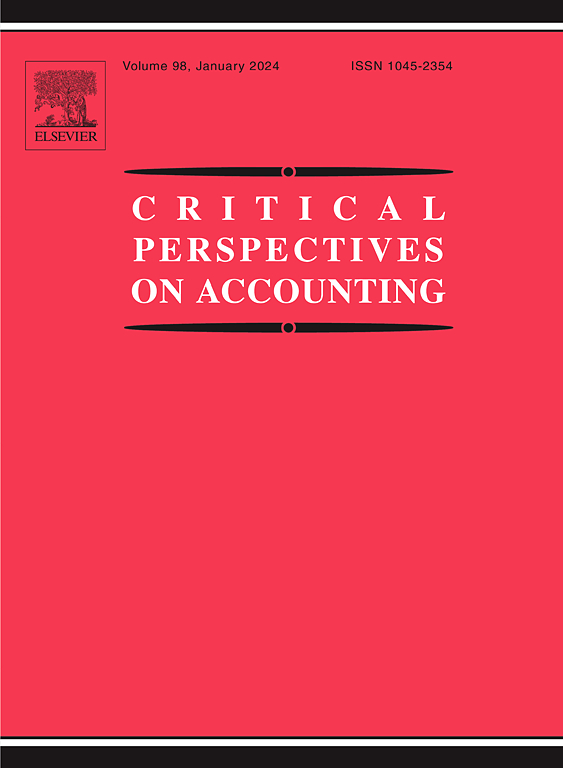转型的边界:南非四大会计师事务所的种族、合规和身份工作
IF 5.7
2区 管理学
Q1 BUSINESS, FINANCE
引用次数: 0
摘要
本文采用组织理论中的“边界工作”概念,对四大审计事务所如何试图使其行为合法化、维护其声誉并扩大其在资本市场的影响力进行了研究。南非后种族隔离时代的社会政治背景,加上最近对四大所施加的监管压力,要求它们展示“真实的”和“真正的”种族转型,为探索四大所的行为提供了一个机会。在种族和种族主义问题上,由于这个话题的高度争议性,以及围绕种族的对话通常是谨慎的、非正式的,因此不透明,研究受到了限制。然而,在南非,政府多年来已经完善了一个复杂的立法“记分卡”,供组织(尤其是公司)“衡量”他们的种族平等表现。这一制度在公共事务和公司事务中占有相当重要的地位;事实上,它是在种族问题上建立社会合法性的“会计机制”。通过对议会辩论和监管沟通的话语分析,我们展示了四大的“机构创业精神”。运用批判性种族理论,我们的解释强调了当种族平等被“衡量”和“绩效”由有效的基于合规性的会计系统决定时所产生的意想不到的后果和悖论。我们认为,这样的制度阻碍而不是促进建设性的对话,有意或无意地隐藏了实现包容性机会、信任和尊重的真正转变的“文化”所需的观点。我们还提供了另一个例子,说明四大律师事务所将自己描述为美德的典范,“转型变革的推动者”,以这样一种方式传达这样一种观点,即如果没有他们的勇敢努力,种族平等就无法在当地职业中实现。这样的修辞再次显示了四大如何将商业主义和专业主义这两种占主导地位的制度逻辑视为互补,而不是冲突或矛盾。本文章由计算机程序翻译,如有差异,请以英文原文为准。
Boundaries of transformation: Race, compliance, and identity work in South Africa’s Big Four accounting firms
Employing a conceptualization of identity work as ‘boundary work’ from organizational theory, this paper contributes to research examining how the Big Four audit firms attempt to legitimize their behavior, preserve their reputation, and grow their influence in capital markets. The South African post-apartheid socio-political context, together with recent regulatory pressures placed on the Big Four to demonstrate ‘true’ and ‘genuine’ racial transformation, provides an opportune setting to explore the behavior of the Big Four. On matters of race and racism, research is limited by the highly contested nature of the topic and the fact that dialogue surrounding race is usually guarded, informal, and thereby opaque. Yet, in South Africa, the government has refined over the years an intricate legislated ‘scorecard’ for organizations (especially corporates) to ‘measure’ their racial equity performance. This system is given considerable prominence in public and corporate affairs; indeed, it is ‘an accounting mechanism’ for establishing social legitimacy in matters of race. Through a discourse analysis of parliamentary debate and regulatory communications, we showcase the ‘institutional entrepreneurialism’ of the Big Four. Applying Critical Race Theory, our interpretation highlights unintended consequences and paradoxes which are created when race equity is ‘measured’ and ‘performance’ is determined by what is effectively a compliance-based accounting system. We argue that such a system hinders rather than promotes constructive conversation and hides, intentionally or unintentionally, the perspectives needed to achieve a truly transformed ‘culture’ of inclusive opportunity, trust, and respect. We also provide a further example of the Big Four representing themselves as paragons of virtue, ‘agents of transformational change’, in such a manner as to convey the idea that racial equity cannot be achieved in the local profession without their valiant efforts. Such rhetoric again shows how the Big Four represent the two dominant institutional logics of commercialism and professionalism as complementary, not conflicting, or contradictory.
求助全文
通过发布文献求助,成功后即可免费获取论文全文。
去求助
来源期刊

Critical Perspectives on Accounting
BUSINESS, FINANCE-
CiteScore
9.40
自引率
7.80%
发文量
91
期刊介绍:
Critical Perspectives on Accounting aims to provide a forum for the growing number of accounting researchers and practitioners who realize that conventional theory and practice is ill-suited to the challenges of the modern environment, and that accounting practices and corporate behavior are inextricably connected with many allocative, distributive, social, and ecological problems of our era. From such concerns, a new literature is emerging that seeks to reformulate corporate, social, and political activity, and the theoretical and practical means by which we apprehend and affect that activity. Research Areas Include: • Studies involving the political economy of accounting, critical accounting, radical accounting, and accounting''s implication in the exercise of power • Financial accounting''s role in the processes of international capital formation, including its impact on stock market stability and international banking activities • Management accounting''s role in organizing the labor process • The relationship between accounting and the state in various social formations • Studies of accounting''s historical role, as a means of "remembering" the subject''s social and conflictual character • The role of accounting in establishing "real" democracy at work and other domains of life • Accounting''s adjudicative function in international exchanges, such as that of the Third World debt • Antagonisms between the social and private character of accounting, such as conflicts of interest in the audit process • The identification of new constituencies for radical and critical accounting information • Accounting''s involvement in gender and class conflicts in the workplace • The interplay between accounting, social conflict, industrialization, bureaucracy, and technocracy • Reappraisals of the role of accounting as a science and technology • Critical reviews of "useful" scientific knowledge about organizations
 求助内容:
求助内容: 应助结果提醒方式:
应助结果提醒方式:


